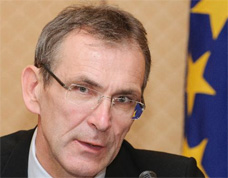Statement by EU Development Commissioner Andris Piebalgs in reaction to the Court of Auditor's report

Brussels, 28 March 2012 – I welcome today's report by the Court of Auditors on EU aid for food security in sub-Saharan Africa. I am very pleased to see that t the Court considers that our work is "mostly effective and makes an important contribution to ensuring that people have access to food". These are encouraging conclusions at a time when supporting food security is high on the political agenda, as showed by the recent announcements of further support in the Horn of Africa and Sahel. However, there is no room for complacency and we share the Court's conclusions and recommendations.
Today, close to one billion people around the world are chronically under-nourished, and about 60 million of these are children under the age of five in sub-Saharan Africa. The report will help us to improve the way we deliver on one of our most important roles: making sure that every person has enough to eat and that food contains the essential nutritional elements which the human body needs.
We have already taken significant steps in this direction with the adoption in October 2011 of the Agenda for Change of European Development policy; which agriculture and food security form a central pillar of ( it both are considered as key areas for overcoming poverty and achieving sustainable and inclusive growth.) Food security, including nutrition, will be a priority when we start programming our EU development assistance for the years 2014 to 2020. As recommended by the Court, the Commission and the European External Action Service will work on a structured assessment of the food security situation in each country and will consider the potential scope for EU support in this area.
I was also pleased to read that the Court confirms that the EU's work to sustainably improve access to food is "highly relevant to the needs and priorities of the people in sub-Saharan Africa". It describes our interventions as "well designed, based on sound knowledge of priorities and involving close dialogue with the governments of partner countries". The Court further makes recommendations which we fully endorse and on which we have already started to work: for example, the development of a science-based "food security" screening of countries; and, for food insecure countries, a systematic review of the potential added value and scope of EU support in this context.
We are also already focusing more on issues of nutrition, defining measurable objectives for projects and making sure that programmes have lasting effect. The Commission has been leading the renewed international movement to give priority to nutrition, notably with the launch of the SUN (Scaling Up Nutrition) global initiative, which already includes 20 developing countries.
he Court is therefore right in stating that EU programmes must further ensure that food has the right nutritional content. More will be done to support groups which are particularly vulnerable in this respect, above all women and children. Our future work will also focus on poor households, communities in remote areas and pastoralists. A broader range of food security, rural development and agricultural programmes will be designed to better address undernutrition.
I am determined to constantly improve the quality of our interventions, through more rigorous quality standards and defining clear and measurable impact indicators for all our food security programmes. This is a critical and priority area and I am committed to make everything possible so that every euro spent has the highest impact on people in need".
Background:
Providing enough and the right food to people in Africa remains an important focus of the Commission's work, especially in regions that are regularly hit by droughts. The Commission has recently adopted initiatives of more than €400 million to respond in the short, medium and long term to the food crises in the Horn of Africa and the Sahel.
Food security is also at the top of the development agenda of international fora such as G8 and G20. The European Union is the largest contributor to the G8 L'Aquila Food Security Initiative, with a pledge of USD 3.9 billion to food security over three years, and will remain a major actor in this sector.
Contacts :
Catherine Ray (+32 2 296 99 21)
Wojtek Talko (+32 2 297 85 51)















